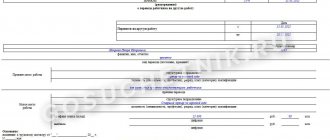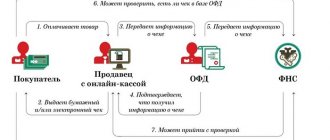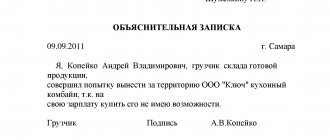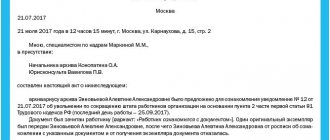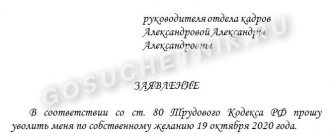Source: Journal “Human Resources Department of a State (Municipal) Institution”
“If you don’t want it in a good way, I’ll fire you for inconsistency!” - the manager shouts in anger at a subordinate who failed to complete the assigned task or performed his functions poorly. But does the manager, threatening dismissal “under the article”, realize the complexity and duration of such termination of the employment contract? After all, dismissal at the initiative of the employer very often ends in labor disputes, since many managers simply do not want to delve into the dismissal procedure, forget about meeting deadlines, and referring to the database of local regulations does not always help. Today we will talk about perhaps one of the most difficult grounds for dismissal - the employee’s inadequacy for the position held or the work performed due to insufficient qualifications, confirmed by certification results.
Dismissal for incompetence: the most important thing
The possibility of terminating an employment contract (hereinafter referred to as TD) for non-compliance with the position held is provided for in clause 3, part 1 of Art. 81 Labor Code of the Russian Federation. If an employer believes that an employee is not suitable for him in terms of experience, qualifications or other criteria, he can fire him.
But not everything is so simple - you need to take into account several features:
- The discrepancy must be confirmed by the results of certification (assessment, examination) (clause 31 of the Resolution of the Plenum of the Armed Forces of the Russian Federation of March 17, 2004 No. 2 “On the application by courts ...”).
- The examination must be provided for by law: for example, it is mandatory for personnel working with hazardous production facilities; teachers; Civil Defense and Emergency Situations rescuers; police officers and the National Guard.
- If an assessment is not required by law, it may be provided for by the company’s local regulations. If there is no provision for certification there, but the employee will be fired under clause 3, part 1 of art. 81 of the Labor Code, he will be able to challenge this in court.
- Before termination due to unsatisfactory exam results, the employer is obliged to offer the subordinate other available vacancies corresponding to his experience and qualifications. If there are no such vacancies or he refuses them, he can be fired.
- If the employee is a member of a trade union, the opinion of the trade union body will be required (Part 2 of Article 81 of the Labor Code of the Russian Federation).
Jobs should be offered in the employee’s region of residence. If they are not there, but are in another area, they are offered only if this is provided for by the internal documents of the organization.
Let us consider in detail the features of dismissal under clause 3 of Article 81 of the Labor Code in some cases.
Dismissal of a teacher
According to Art. 49 Federal Law dated December 29, 2012 No. 273-FZ “On Education...”, certification of teaching staff is mandatory once every five years. To dismiss a teacher for professional incompetence, a commission opinion will be required, but before this, according to the Labor Code of the Russian Federation, the director is obliged to offer him any vacancies, including lower-level ones.
Dismissal of an accountant
If an accountant (including the chief accountant) makes many mistakes, this must be confirmed by audit reports and audit reports. But you won’t be able to avoid the exam—it’s required by law. The commission will conduct an “exam”, the employer will offer vacant positions, and only in the absence of them or the refusal of the subordinate can the TD be terminated.
In addition to the commission’s conclusion, it is better to stock up on documents confirming the accountant’s mistakes. The employer may need them if the fired person decides to be reinstated in the workplace through the court.
Dismissal from the civil service
It is also possible to dismiss a civil servant for non-compliance with the civil service, but you need to refer not to the Labor Code of the Russian Federation, but to the Federal Law of July 27, 2004 No. 79-FZ “On the State Civil Service...”. For example, in Art. 37 Federal Law No. 79-FZ states that an employee may be dismissed due to insufficient qualifications at the initiative of a representative of the employer.
Other positions must also be offered, but the order (instruction) to terminate the contract is issued by the head of the administration or other body. The conclusion of the commission is indicated as the basis.
On probation
It is also possible to terminate the employment relationship under Clause 3, Part 1, Article 81 of the Labor Code with an employee on a probationary period, but it is easier to do this under Art. 71 of the Labor Code of the Russian Federation - due to unsatisfactory test results. Then you won’t have to offer him other vacancies, and local documents on mandatory assessment are not required.
An unsatisfactory test result is confirmed by the conclusion of the immediate supervisor. The person being dismissed must be notified of termination at least three days in advance.
The concept of “certification” and the obligation to carry it out
Based on definitions in dictionaries and legal norms, we can say that certification is a procedure carried out to evaluate the work of an employee, determine his business qualities and qualifications in order to establish his suitability for the position held.
What is meant by qualification is explained in Art. 195.1 of the Labor Code of the Russian Federation : this is the level of knowledge, skills, professional skills and experience of the employee. The characteristics of the qualifications required for an employee to carry out a certain type of professional activity are contained in professional standards, ETKS [1] and the qualification directory of positions for managers, specialists and employees [2].
For your information
Currently, professional standards are being actively developed, which will ultimately replace qualification reference books.
Based on qualification reference books and professional standards, the employer develops job descriptions. They define the duties, rights and responsibilities of an employee holding a certain position. In addition, the employer can specify in them the requirements for work experience and level of education, as well as other requirements for a particular position (for example, knowledge of one or more foreign languages, the ability to work on a computer)[3].
It should be noted that job regulations are being developed for state civil servants, the provisions of which are taken into account during certification. And the results of the execution of official regulations by virtue of Art. 47 of the Federal Law of July 27, 2004 No. 79-FZ “On the State Civil Service of the Russian Federation” are taken into account when assessing the professional activity of an employee during certification.
It is necessary to clearly and uniformly define the requirements for length of service and experience, professional skills and education for a specific position or profession, so that during the certification procedure, the results of which may serve as grounds for dismissal of an employee, no questions arise regarding the interpretation of certain provisions of the instructions.
Regarding the mandatory nature of certification, we will say the following. Carrying out this procedure in commercial structures is not necessary: neither the Labor Code nor any other regulatory act requires this. However, if the company’s activities are carried out in a special field, such as education, certification will still have to be carried out.
But for some areas of activity or categories of employees, laws and departmental acts establish the obligation to conduct certification. Let's name some of them:
- state civil and municipal employees[4];
- police officers[5];
- teaching staff ( Federal Law of December 29, 2012 No. 273-FZ “On Education in the Russian Federation” );
- rescuers ( Article 24 of the Federal Law of August 22, 1995 No. 151-FZ “On emergency rescue services and the status of rescuers” );
- prosecutorial employees who have class ranks or occupy positions for which the assignment of class ranks is provided ( Article 41 of the Federal Law of January 17, 1992 No. 2202‑1 “On the Prosecutor’s Office of the Russian Federation” );
- employees of the Investigative Committee ( Article 21 of the Federal Law of December 28, 2010 No. 403-FZ “On the Investigative Committee of the Russian Federation” );
- heads of unitary enterprises ( Article 21 of the Federal Law of November 14, 2002 No. 161-FZ “On State and Municipal Unitary Enterprises” );
- workers of a hazardous production facility[6];
- persons holding positions related to ensuring the safety of navigation, flights and the movement of ground vehicles ( clause 9 of the Decree of the Government of the Russian Federation of August 30, 1993 No. 876 )[7].
Please note:
If an employee constantly fails to complete tasks, performs his work poorly, or does not perform any functions at all, the employer has the right to initiate an unscheduled certification. Its results may also be grounds for dismissal. Let us note that some regulations establishing the procedure for certification of employees of certain categories provide for the possibility of carrying out such certification, indicating the reasons, in the event of which it is possible to certify an employee unscheduled. For example, according to the Order of the Prosecutor General's Office of the Russian Federation dated June 20, 2012 No. 242 [8], an extraordinary certification of a prosecutor's employee is carried out in the presence of significant omissions in service, at the request of the employee himself, as well as by the certification commissions of the prosecutor's offices of the constituent entities of the Russian Federation and equivalent specialized prosecutor's offices, the Academy of the Prosecutor General's Office upon nomination to a higher position.
Who can't be fired
There are certain categories of employees with whom the contract cannot be terminated for unsuitability, even if they are not suitable for the work performed:
| Worker | Base |
| Pregnant woman. She can be fired only due to the liquidation of the company or closure of the individual entrepreneur | 261 Labor Code of the Russian Federation |
| Parents with children under three years old, a single mother with a child under 18 years old or a disabled child under 14 years old; sole breadwinners of disabled minor children or in large families with a child under three years of age | |
| Representatives of workers during collective bargaining - the consent of the authorities authorizing them for representation will be required | part 3 art. 39 Labor Code of the Russian Federation |
| Personnel under the age of 18 – consent of the Commission on Minors’ Affairs, Labor Inspectorate is required | Art. 269 Labor Code of the Russian Federation |
| Trade union members. Dismissal can only be made with the consent of a higher trade union body | Art. 374 Labor Code of the Russian Federation |
You cannot terminate a contract with a young specialist who does not have the necessary experience due to short work experience. Dismissal due to lack of special education will also not work if it was not initially required during employment.
Dismissal for drunkenness (under article) - features and conditions
Dismissal of the chief accountant
How to prove that an employee is not suitable for the position?
If an employer plans to terminate cooperation with one of his subordinates due to a lack of certain skills, then he will need to prove the employee’s incompetence at the job he is performing.
Prerequisites for recertification of an employee may be:
- Sustaining an injury that makes it impossible to fully perform your duties.
- Regular deterioration in the quality of an employee’s work.
- Failure to implement the plan required by the enterprise.
- Re-equipment of offices and workshops, which require completely different qualities and skills.
Information
There can be many examples of inconsistency, for example, a citizen works as a loader, but gets a back injury and subsequently does his job worse or slower, which in turn will not suit the employer and will lead to the idea of dismissal. Another situation may be the installation of new software in offices where an employee with a Soviet education works, and for normal work activities she needs to take courses to improve her qualifications or be fired due to insolvency.
Evidence of non-compliance is achieved by:
- Knowledge certification.
- Medical examination.
Attention
The employer must take into account the fact that the requirements for a particular position must be specified in the employment contract and in a document such as job descriptions.
For example, if a cook is allergic to dishwashing detergents, they will not be able to fire him due to non-compliance, because job descriptions do not include washing kitchen utensils. Another option for the impossibility of dismissal under Article 81 (clause 3) may be the lack of knowledge of car repair by a full-time driver.
Is certification required?
Some believe that an employee can be fired without certification, having carried out only an independent assessment of qualifications (Article 196 of the Labor Code of the Russian Federation). This is not true: the assessment is carried out at the request of the employer with the consent of the employee, but is not mandatory.
The assessment is carried out by qualification centers, and if the result is unsatisfactory, it will not be possible to dismiss a subordinate under clause 3, part 1, article 81 of the Labor Code. However, the assessment may be one of the stages of the examination, but in any case, the conclusion of the certification commission from the employing organization will be required.
Briefly
- Certification by profession is mandatory for workers of certain professions and government officials. Commercial organizations are not required to conduct certification, but have the right to do so.
- The procedure is regulated by the internal LNA, which describes in detail the certification process and its documentation. In addition to the scheduled one, which is carried out at least once every 5 years, an unscheduled certification may be carried out in relation to an individual employee, if there are compelling reasons and such a possibility is specified in the LNA.
- Based on the results of the certification, the employee may receive a one-time incentive, higher qualifications, or he may be offered dismissal if the results of the certification indicate incompetence.
How to fire for non-compliance with the position held: step-by-step instructions
The procedure for dismissal for professional incompetence is as follows:
- The employer conducts certification.
- The employee is offered available vacancies for transfer.
- A dismissal order is issued.
- A work book and personal card are filled out.
- Documents and final payment are issued.
Let's look at the procedure step by step in detail.
Step 1: certification
This is a mandatory stage, without which the relationship cannot be terminated. If exams are provided for by law, there will be a procedure for conducting them. For example, for teaching staff, the Order of the Ministry of Education and Science dated 04/07/2014 No. 276 “On approval of the Procedure...” is relevant. For state civil servants - Article 48 of the Federal Law No. 79-FZ, Decree of the President of the Russian Federation dated 02/01/2005 No. 110 “On certification...”.
What needs to be done if the assessment is not required by law:
- Create and adopt a regulation on the procedure for personnel certification. Everyone is introduced to him by signing.
- Issue an order to test the employee's professional suitability.
- Receive the commission's conclusion on unsatisfactory inspection results.
Sample order
Step 2: Transfer Offer
As mentioned earlier, if an employee has not passed recertification and the manager has a conclusion about unsatisfactory results, before terminating the TD, other positions must be offered.
What the proposal should contain:
- information about the company and employer;
- list of vacancies;
- date of compilation;
- information that in case of refusal the employee will be dismissed under clause 3, part 1 of art. 81 Labor Code of the Russian Federation;
- deadline for making a decision on transfer or refusal;
- manager's signature.
You can proceed to the next step only if there are no available vacancies or the person has refused them. The refusal must be made in writing.
Sample application
Step 3: placing an order
If you need to dismiss one employee, the order is drawn up in form T-8. To terminate a contract if there is a discrepancy with the position on a staff of two or more people, it is better to use form T-8a.
What information is reflected in the order:
- date, number;
- Company name;
- Full name, position of manager;
- Full name, department, position of the person being dismissed;
- date of termination of TD;
- the wording “in connection with the inadequacy of the position held, confirmed by the results of certification, paragraph 3 of part 1 of Article 81 of the Labor Code of the Russian Federation”;
- the basis document – the conclusion of the commission, date and number; commission protocol, proposal for transfer, refusal to transfer;
- signatures of the parties - the employer and the dismissed person.
The employee must be familiarized with the order within three days from the date of publication.
Sample order
Step 4: filling out the work book
An entry in the work book is usually made by a personnel officer. As a standard, it indicates the serial number, date, as well as the wording “the employment contract was terminated due to the employee’s inadequacy for the position held, confirmed by the results of certification, paragraph 3 of part 1 of Article 81 of the Labor Code of the Russian Federation.” The last column indicates the order, its date and number.
If an electronic work book is maintained, the SZV-TD form is filled out, approved by Resolution of the Pension Fund Board of December 25, 2009 No. 730p “On approval...”. Almost the same information is indicated there as on paper.
The SZV-TD must be sent to the Pension Fund no later than the 15th day of the month following the month of dismissal.
Step 5: issuance of documents and final payment
On the day of termination of TD, the employee is issued a paper work book, SZV-M, SZV-TD, pay slip, and certificate of earnings for the last two years. At the same time, the final payment is paid, consisting of wages for the period worked and compensation for all unused vacation days.
Additional “safety net” for the employer
If the lack of qualifications for which it is planned to dismiss an employee is obvious, it manifests itself not only during certification. To further confirm that an employee’s level is insufficient, you can stock up on the following documents:
- a memo(s) from the immediate supervisor indicating poor performance of one’s duties;
- acts stating that a defect was identified in the employee’s work;
- written customer complaints;
- an order to issue a reprimand;
- other documentary evidence, for example, for a driver this may be deprivation of a license;
- if the organization has a trade union, it is worth obtaining its consent to dismiss the negligent employee.
How to avoid dismissal under article
If recertification is coming at an enterprise and a person suspects that he will not pass it, there are several options:
- Resign of your own free will, so as not to spoil your work record. This is relevant if the recertification has not yet been completed and there is no conclusion - a document on the basis of which the director can dismiss.
- Prepare well for the exams so that even the most picky commission gives a good conclusion.
If the employer threatens dismissal for non-compliance, but the employee knows that he is exactly suitable for the job being performed, there is no need to be afraid: most likely, the commission will give a good conclusion if he actually has to take exams.
If recertification has begun, but is not provided for by law or local regulations, employees can complain to the labor inspectorate. Such actions by the employer are considered a violation. You can submit a complaint in person or through the Online Inspection service.
Registration of the dismissal order in the appropriate journal
The drafted and signed order to terminate the employment contract is subject to registration in the logbook for registering orders for personnel. This journal records orders for all employees of the organization (IE), in particular, for admission, transfer, bonuses, business trips, dismissal, etc.
note
that orders for the first persons of the organization (manager, chief accountant and other persons, information about which is reflected in the charter) are registered in another journal - the journal for registering orders for core activities.
This document does not have a strictly established form and is developed by the employer independently.
The shelf life of the logbook for registering orders for personnel is 75 years
.
Journal of registration of orders for personnel ().
Fired for lack of qualifications: what to do
The court may declare dismissal under clause 3, part 1, article 81 of the Labor Code illegal in several situations. For example, if, according to the law, recertification could not be carried out, or the commission gave a false conclusion, but in fact the employee is professionally suitable. It is also possible to challenge the termination of the contract if the employee could not be fired, or the commission made a decision on compliance.
To be reinstated at work, you need to file a claim with the district court at the address of the defendant-employer. But you can do this at your place of residence (Article 29 of the Code of Civil Procedure of the Russian Federation). The deadline for filing claims for disputes regarding dismissal is one month from the date of receipt of the work record book or a copy of the order (Article 392 of the Civil Code of the Russian Federation).
In court, the plaintiff will have to prove his position, but the defendant must also confirm that he fired the plaintiff justifiably. You will need the commission protocol and other documents drawn up during the procedure. If the court satisfies the plaintiff's demands, he will be reinstated to his old place of work. But you don’t have to file a demand for reinstatement, asking to recover compensation for moral damages from the defendant and oblige him to change the wording of the dismissal.
Payments in case of bankruptcy of a company
If a company is declared bankrupt, all payments, including settlements with employees, are made in the order established by Federal Law No. 127-FZ of October 26, 2002 “On Insolvency (Bankruptcy).”
First, claims for payments related to legal costs in the bankruptcy case, for example, remuneration to the insolvency administrator, are satisfied.
Then, the current requirements for wages of persons working or who worked under an employment contract and requirements for the payment of severance pay are satisfied.
Challenging dismissal for inadequacy of the position: judicial practice
Let's look at a few examples of real decisions on disputes regarding termination of a contract for insufficient qualifications and inadequacy for the position held:
- The plaintiff did not agree with the exam results, asked to declare them invalid, and also to recover from the defendant the average salary for the period of forced absence, to oblige her to be reinstated at work, and to pay moral compensation. By decision No. 2-4946/2019 2-4946/2019 ~ M-4285/2019 M-4285/2019 dated July 15, 2021, in case No. 2-4946/2019, the claims were denied - the court did not find any violations during the assessment.
- The woman worked as a labor and wages specialist in the organization for more than five years. The certification committee decided that she was unsuitable for the job, and the chairman of the workers' union accused her of incorrectly calculating overtime hours. After re-certification, she was offered lower-level positions, which she refused, and the employment contract was terminated under clause 3, part 1 of Art. 81 Labor Code of the Russian Federation. Through the court, the plaintiff wanted to be reinstated at work and recover money from the organization. Decision No. 2-139/2019 2-139/2019(2-1890/2018;)~M-1916/2018 2-1890/2018 M-1916/2018 dated February 14, 2021 in case No. 2-139/2019 the requirements were partially satisfied. The court declared the employer’s actions illegal, ordered him to pay the average salary for the period of forced absence, and recalculate the plaintiff’s salary.
- The plaintiff was fired; she was a tram driver on regular city passenger routes. She was not familiarized with the protocol of the certification commission; the employer offered her another position. She agreed to it, but was still fired under clause 3, part 1, article 81 of the Labor Code of the Russian Federation. In court, the plaintiff asked to recognize the exam results as illegal, reinstate her at work, and recover her average earnings for the period of forced absence. By decision No. 2-3043/2018 2-3043/2018~M-2709/2018 M-2709/2018 dated September 21, 2018 in case No. 2-3043/2018, the requirements were satisfied in full.
Notifying the employee of the upcoming termination of the employment contract.
Before dismissal, the employer is obliged to notify the employee of the decision. The notice period for dismissal on this basis is not established by law, and therefore the employer himself decides when to do this.
The notification is drawn up in writing, in 2 copies. On the copy that remains with the employer, the employee indicates that he was familiarized with the upcoming dismissal, puts his signature and the date of familiarization.
Sample notification to an employee of dismissal due to inadequacy of the position held or work performed due to insufficient qualifications ().
Lawyer's answers to private questions
Is it possible to fire for inadequacy of the position held if the employee is on vacation?
No. Termination at the initiative of the employer is not allowed if the employee is on vacation or sick leave. You need to wait until he comes out and then fire him.
Can a bus driver be fired for unsuitability for the position if he does not have category D?
No. The fact that the driver does not have such a category was known to the employer initially during employment. The driver can work if he has DE or other categories that give him the right to engage in passenger transportation.
Can they refuse employment if they were fired from their previous job for inadequacy?
This is prohibited by law, but in reality they can refuse, citing the fact that education and skills are not suitable for work in a particular place. Sometimes dismissal under clause 3, part 1, art. 81 of the Labor Code of the Russian Federation alarms other employers. It is better to ask for a written refusal explaining the reasons. If the refusal was illegal, you can appeal it in court.
Will they pay unemployment benefits if they are fired for unsuitability?
Yes. The basis for termination of TD in this case does not matter; benefits must be assigned.
Can an employer retain an employee who has been found unsuitable by the commission?
Yes. Termination of a contract under Article 81 of the Labor Code of the Russian Federation is a right, not an obligation of the manager. If he doesn't want to fire, he doesn't have to do it. Or schedule a second re-certification to ensure the reliability of the findings of the first commission. The exception is employees of state or municipal institutions: they are usually fired immediately.
What payments are due to an employee and how to calculate them (table)
Dismissal due to a person’s qualifications not matching the position held does not imply any special payments to the employee. The employer must issue the final payment on the last day of work (Article 140 of the Labor Code).
| Name of payment | Calculation procedure (formula) | Example |
| Payment for time worked (including time allowances, premiums and bonuses) | Official salary/amount of working time per month × amount of time worked per month. Official salary × bonus in percentage terms/amount of working time in a month × amount of time worked in a month. | Plumber A.V. Nikolaev will be dismissed in accordance with the results of the certification on September 9, 2021. His official salary is 15,000 rubles. per month. According to the production calendar, September 2021 will have 22 working days. Of these, Nikolaev worked 7. Payment for time worked will be: 15,000 rubles/22 days × 7 days = 4,773 rubles. The company has a Regulation on employee incentives, according to which all employees who have worked for this employer for more than a year are paid a salary bonus of 7% monthly. The payment of bonuses in accordance with the legal regulations does not depend on the reason for the employee’s dismissal. The amount of the bonus on the day of dismissal will be: 15,000 rubles. × 7%/22 days × 7 days = 334 rub. |
| Reimbursement for earned but unused vacation days | Average daily earnings × number of days of non-vacation. Average daily earnings = income for the previous 12-month period/12 months/29.3 days. Number of unused days = (total number of vacation days/12 months × number of full months worked in the period) - number of vacation days used. | For the period 09.2015–08.2016, Nikolaev earned (excluding social and compensation payments) 192,600 rubles. During this time he was not on vacation or sick leave. Average daily earnings will be: 192,600 rubles/12 months/29.3 days = 548 rubles. The current working period for calculating vacation for Nikolaev is from April 1, 2021 to March 31, 2017. He is entitled to 28 days of vacation annually. Full months worked for the period - 5. The number of vacation days subject to compensation will be: 28 days / 12 months × 5 months = 11.6 days. Compensation for vacation will be: 548 rubles. × 11.6 days = 6,357 rub. |
Review and characteristics
During the process, a review (characteristic) and an attestation sheet are compiled for each employee. The data reflected in these documents is taken into account during subsequent certifications.
The review, which must contain an assessment of the employee’s professional and personal qualities and the results of his work, is drawn up and signed by the head of the structural unit.
If a manager is subject to certification, information about the results of the work of his department is included in his characteristics. Two weeks before the certification, the employee must be presented with the review so that he can exercise his right to provide the commission with additional information about his work activities and/or state disagreement with the manager’s conclusions.
No later than a week before certification, the characteristics must be submitted to the certification commission.
...no later than a week before certification, the characteristics must be submitted to the certification commission...
Certification is carried out in the presence of the employee.
There is only one exception to this rule: if an employee does not appear at a meeting of the commission without good reason, certification can be carried out without him. The certification sheet must be signed by all members of the certification commission. The contents of this document must be familiarized to the employee against signature.
The commission reviews the submitted documents (attestation sheet, review), then hears the employee’s report on his professional activities. Questions asked to an employee during certification can only relate to his professional activities.
When assessing an employee’s suitability for the position held, his work experience, advanced training, level of education, etc. are also taken into account; if we are talking about a leader, then his organizational skills, ability to ensure discipline, and well-coordinated team work.
Only if all these conditions are met will the commission’s decision be considered factually and legally justified.
Responsible decisions
What decisions can a manager make based on the results of certification?
1. The employee corresponds to his position, his activities are highly valued and it is recommended that he:
- to promote;
- be included in the nomination reserve;
- leave the salary unchanged;
- establish a special bonus to the regular salary;
- maintain the current allowance;
- change job functions;
- change bonus terms.
2. An employee is eligible for the position provided that:
- improving the performance of certain tasks or functions;
- advanced training;
- changes in job functions;
- changes in bonus conditions;
- re-certification after two to six months.
3. The employee is not suitable for the position held and it is recommended that:
- demotion;
- dismissal;
